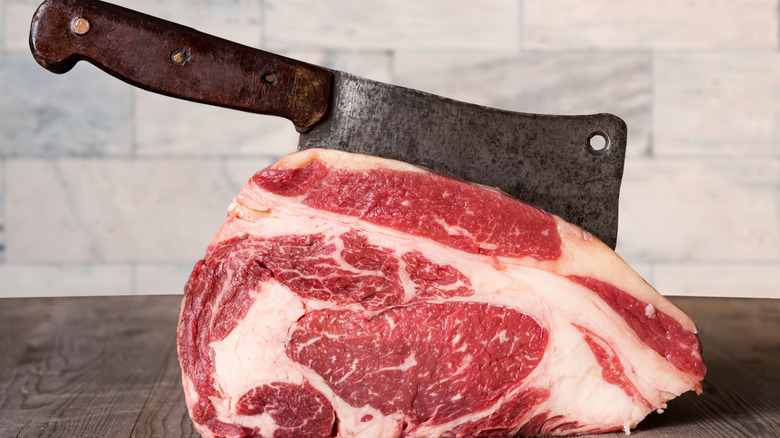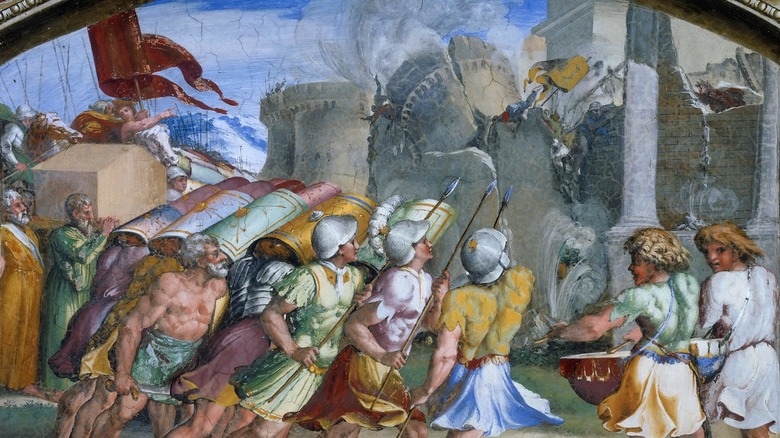Strange Rules In The Bible Most People Haven't Heard About
Most people in the English-speaking world (and a lot of the rest of it) will be at least passingly familiar with the Ten Commandments, the series of 10 basic moral laws given to Moses by God prior to the ancient Hebrew people entering into the Promised Land. In fact, even non-religious people can probably name a few of the more basic commandments — don't murder, don't steal, honor your father and mother, and so on. But across the first five books of the Bible — known variously as the Torah, the Pentateuch, or the Books of Moses — there are a lot more than 10 rules. Jewish tradition numbers them at 613, and once there get to be that many rules, it stands to reason that some of them are going to be a lot more specific and a lot less well-known than others.
As strange as some of these rules might seem, it's worth noting that — as biblical scholar Dr. Dan McClellan points out — the majority of these laws would not have been enforced in biblical times, and their existence as a series of documents served to establish a sense of prestige and moral uprightness for the people of Israel. So with that in mind, here are some biblical commandments that you might not have heard of (and which might never have been observed).
Only kill burglars at night
Don't worry, everyone: God says it's okay to kill a burglar. If a thief is sneaking into your house and you strike him dead, you have brought no bloodguilt on yourself. That is, of course, as long as it's before sunrise. If the sun is up and you can see the burglar, and you still rock his block off with a baseball bat, that's murder and you have to deal with all that. This can be found in Exodus 22:1-3, which talks about rules concerning restitution for theft. The information that it's okay to kill an intruder after dark is literally a parenthetical to the statement that if you steal an ox from someone, you have to repay them five oxen if you get caught.
Why does sunlight make a difference? Similar laws can be found among ancient Greek and Roman statutes as well, so clearly multiple cultures thought there was a logic to it. The idea seems to be that in the dark, a homeowner would not be able to see a burglar well enough to identify them, and so their only recourse would be to try to fight them off. In the daylight, however, you could (theoretically) see the face of the intruder and later publicly accuse them of the theft and have them brought to justice. Anyone who knowingly killed an intruder they could identify would be subject to the death penalty.
Don't boil a baby goat in its mother's milk
Some of the most well-known rules and laws in the Bible outside of the Ten Commandments include the dietary laws that some practicing Jews and even a few Christian denominations observe, such as no eating pork or shellfish. What may be less commonly known, however, is that observant Jews also typically don't eat meat and dairy together, meaning that cheeseburgers are not considered kosher. The ultimate source for this rule comes from the second half of Exodus 23:19, which says, "You shall not boil a kid in its mother's milk." (Kid, in this case, means a young goat, not a human child.) As strange as it seems, however, this law was apparently important enough to repeat in both Exodus 34:26 and Deuteronomy 14:21.
While rabbinic interpretation has resulted in this verse being seen as a prohibition on meat and cheese together, that seems unlikely to have been the original intent of the law. While some commentators have suggested that this command is a prohibition against some kind of pagan fertility rite in which such milk was sprinkled over crops to ensure a good harvest, the command's repetition in Deuteronomy next to a list of unclean foods suggests such a goat is just not supposed to be eaten. As such, many commentators believe this was simply a law against cruelty to animals, especially ones young enough to still be nursing.
[Featured image by Pinoydiscus via Wikimedia Commons | Cropped and scaled | CC BY-SA 3.0]
Don't eat fat
Leviticus 3:17 gives a pretty straightforward commandment: "You must not eat any fat or any blood." Well, the blood part is easy to understand. Jews who keep kosher do not eat any animal blood. Animals that are butchered in accordance with Jewish law are drained of blood, soaked, and salted until ruled fit for consumption. The surrounding context of the verse makes clear that people shouldn't eat blood because blood, as the physical embodiment of life force itself, belongs to God. Blood on God's altar serves to purge sins, purify the land, and ward off potential dangers. In fact, not eating blood is one of the commandments that God gives to the whole world and not just the Jews, which means it's actually a more universal law than, for example, not coveting or bearing false witness. (Most Christians, however, do not observe dietary laws.)
The "fat" portion of the law is perhaps a little more confusing: are Jews forbidden from consuming animal fats? Can they not have butter? The prior verses make clear that the prohibition here is against the internal fats surrounding the kidneys and other internal organs, often called suet in English. This specific type of fat is non-kosher, other fats are okay. Why are you not supposed to eat kidney fat? "All fat is the Lord's." Like blood, fat is a seat of life and should be returned to God.
Don't sit where someone on their period has sat
Since Leviticus spends a large portion of its word count talking about ritual purity and impurity, it just makes sense that it would list the things that make a person impure. Some of the things that cause ritual impurity are pretty intuitive — dead bodies, unclean animals, disease — but it probably won't surprise you that some pretty normal body stuff was considered unclean as well. For example, Leviticus 15:16-18 tells us that if a man has a, you know, an emission, he's unclean for the rest of the day and he should take a bath and wash everything his "emission" might have touched. Okay, fair enough. Surely the rules for women's impurity are basically the same, right? Right?
Verses 19-21 tell us that a woman who is on her period is unclean for a full week, and anyone who even touches her is also unclean for the rest of the day. Furthermore, anywhere she sits or lies down while on her period is unclean, and anyone who touches a chair or bed or whatever that she has sat on is unclean for the rest of the day and needs to wash their clothes and take a bath. Superstitions around the defilement that could be caused by menstruation unfortunately were and are common in various world cultures, and the ancient Israelites were no exception.
If you drop a grape, don't pick it up
Several of the precepts in Leviticus 19 concern moral holiness, meaning ways that you can keep the land holy with your behavior, instead of just maintaining ritual purity. Some of these moral teachings will be very familiar, as they're also included among the Ten Commandments: don't steal, don't lie, don't swear falsely in God's name, and so on. In the context of these familiar (and somewhat intuitive) teachings, you might pause when you see the instructions in verses 9-10: when you reap your fields, don't do the outer edges, and if you drop a grape or ear of wheat, don't pick it up. Also, don't pick like every grape in your vineyard.
Why shouldn't you pick up a grape if you drop one? Is it bad luck? Should you throw it over your shoulder like spilled salt, just in case? In this instance, the moral teaching is a straightforward, compassionate one: leave some wheat in your field and leave some grapes on your vines because poor people deserve to eat too. The act of picking up grapes or olives or ears of wheat that had fallen on the ground during the harvest was called gleaning, and it was a right reserved for the destitute and foreigners who didn't have farms of their own. Here the law reminds us that it is sometimes our duty to give up some of our individual rights to reduce the suffering of others.
[Featured image by Galaxyz27 via Wikimedia Commons | Cropped and scaled | CC BY-SA 4.0]
Don't mix fabrics
For those not familiar with the many different laws of the books of Moses, one of the most perplexing is often Leviticus 19:19, which says that you shouldn't wear clothes made of two different materials. This can be confusing to modern readers, who probably have never given thought to the morality of wearing a cotton-poly blend. In biblical times, this commandment would have been understood to mean not to mix wool and linen, and as with many other such commandments, this is one still practiced by orthodox Jews today. But why would God not want people to mix wool and linen? Is this just arbitrary?
The rest of the verse shows that God also commands not to plant more than one kind of seed in the same field and not to breed two different species of livestock with each other (though ancient Israelites definitely used mules, so someone was turning a blind eye at some point). Together, these commands make clear that God is further emphasizing purity and a devotion to each thing's individual properties as bestowed upon it by him, the Creator. Keeping animals, plants, and fibers separate helps to remind the Israelites (and later, Christians, under the teachings of Paul in 2 Corinthians) that they themselves should remain pure and unmingled with their idol-worshiping neighbors. You have to choose: wool or linen, God or idols?
[Featured image by CSIRO via Wikimedia Commons | Cropped and scaled | CC BY 3.0]
Don't trim your temples or beard
One of the commandments that is commonly pointed out as an example of a biblical law that most modern people don't follow is Leviticus 19:27, which says that you shouldn't cut the hair around your temples or trim the edges of your beard. The strict observation of this commandment is what leads to some Jews — including but not exclusively Hasidic Jews — wearing their hair with long, curled sidelocks and long beards. Obviously, this particular look makes the people who sport it stand out in an average crowd, which seems to be exactly the point.
The Bible doesn't give a reason why one shouldn't shave their temples or trim their beard, but the commandment comes in the middle of other prohibitions against practices common among other religions, like ritualistic augury or tattoos, so it seems likely that this rule was meant to make followers of the God of Israel look different from their neighbors. The Greek historian Herodotus says that ancient Arab tribes who worshiped the god Orotal would shave around their temples and ears, leaving only a circle of hair on the top of their head, as a sign of devotion to their god. As a result, it's not hard to understand this law as God saying, "Don't get the Orotal haircut. You don't want people thinking you're one of those nerds."
Disabled people can't approach the altar of God
The third book of the Bible, Leviticus, is primarily concerned with rules and regulations for priests, who came from the priestly class in the tribe of Levi, hence the name of the book. The rules contained inside talk about regulations for making sacrifices, rules for instituting new priests and how to live as a priest, and then a large section having to do with holiness and ritual purity. Some of the most notorious commandments in the Bible come from this section of Leviticus, some of which will come up later.
Chapter 21 of Leviticus specifically deals with the holiness (i.e., ritual purity) of priests, and while some of the restrictions make sense, others seem overly harsh. Priests, it says, shouldn't come in contact with dead bodies, except those of their closest family, and they shouldn't marry former sex workers or divorced women. That last part is pretty rude, but given ancient ideas of purity, understandable. It gets worse when it says that if a priest's daughter becomes a sex worker, she should be set on fire. And then there's a distressingly long list of disabilities or even injuries that you can't have if you want to make the offering to God: blindness, walking impairment including a broken foot, dwarfism, a hunched back, scabs, or crushed testicles, among others. From a modern perspective, this prohibition against physical features people didn't choose seems unlike an all-loving God.
Poison yourself to disprove adultery
One of the strangest passages in the Hebrew books of law comes in Numbers 5:11-31, which describes a kind of trial sometimes known as the ordeal of bitter water. According to this passage, if a man suspects his wife of being unfaithful to him but he doesn't have any witnesses to prove it, he can bring his wife before a priest and request this trial by ordeal. The woman then has her hair loosened and she is handed a grain offering for the Lord. The priest makes her drink a mixture of holy water and dust, and if the woman is innocent, she will be unharmed. If, however, she is guilty of adultery, the bitter water "shall enter into her and cause bitter pain, and her womb shall discharge, her uterus drop, and the woman shall become an execration among her people." While somewhat hard to parse, this probably means infertility rather than miscarriage in the unfaithful woman.
The surprising complexity of this ordeal would have been due to the fact that adultery was seen as particularly damaging to the social order, and the ordeal likely has its origins in similar descriptions from neighboring communities like the Egyptians. It is unclear, however, whether this ritual was ever actually performed, and the practice certainly ended by the time of the destruction of the Second Temple by the Romans in the first century.
Kill entire cities if they worship other gods
While the Book of Deuteronomy is traditionally grouped as the fifth book of the law of Moses, it would actually be more accurate to think of it as the first book of the history of Israel that continues in the subsequent books like Joshua, Judges, Samuel, and Kings. This history focuses on the rewards that come from faithfulness to God and the curses that come from straying from him, as well as the importance of Jerusalem as the sacred place of God, the only place where he can be worshiped. As such, the central premise of the lawbook at the core of Deuteronomy is that the Israelites destroy all pagan cults and rituals within the Promised Land of Canaan in order to make a holy place in which to consolidate the worship of the God of Israel.
This results in some pretty wild and incredibly strict instructions from God via Moses. Chapter 13 says that if a prophet tells you to worship other gods — even if their prophecies and miracles turn out to be real — you have to execute them. If your brother tries to convert you to another religion, stone him to death. But perhaps most shockingly, verses 12 through 18 talk about what to do if a town in Canaan decides to worship another god: kill every single one of them, man, woman, child, and animal. Yes, even the animals.
Don't defend your husband by grabbing his enemy's junk
Ladies, you know that thing when your husband gets in a fight with other dudes and you want to help, so you run up to them while they're tussling and just grab the other dude by the downstairs business and yank real hard so that he stops fighting and your husband wins? Look, we've all been there. Anyway, it turns out that's a sin. And not just like an everyday, "whoops, go to confession" kind of sin. Deuteronomy 25:11-12 says that if a woman does this normal, everyday kind of thing, you should cut her hand off. And worse, you're not even allowed to feel bad for her while you're doing it. "Show no pity," says God.
Apart from the famous "eye for an eye, tooth for a tooth"-style retaliatory punishments elsewhere in the law, this de-handing is the only mutilation prescribed as a penalty in the books of Moses. Why such a serious penalty for defending your husband? It seems that a woman crushing a strange man's junk was a pretty serious taboo, because this was not only an injury done by a woman to a man (a subversion of social hierarchy), but also potentially to his ability to produce children, thereby being an offense against future generations. Similarly, the severity of the punishment serves to remind women of the need to remain restrained in their public behavior.
Women should cover their heads to keep angels from getting turned on
The Gospels aren't as full of specific instructions as the books of Moses, as the teachings of Jesus typically boil down to loving God, loving your neighbor, and selling all your stuff and giving it to the poor. Likewise, the letters of Paul tend to avoid the nitty-gritty of the law because one of Paul's main goals was the conversion of non-Jews, who might be worried that they would have to stop eating pork or being uncircumcised. That said, Paul definitely does occasionally go off in his letters about who should or shouldn't do various things, including telling people not to get married, because he thought the end of the world was coming so soon that there was no point.
One of the most common targets of Paul's instructions is, as you might guess, women. For example, in 1 Corinthians 14:34-35, Paul says women should not be allowed to speak in church, and if they have any questions, they can just ask their husbands at home. Which, yikes. But even more strangely, in Chapter 11 of the same letter, he says a woman must cover her head when she prays, which on its own is not so strange, but he says this is "because of the angels." While the meaning is unclear, it's strongly possible that he thinks women's exposed hair would be too sexy a temptation for any angels observing a prayer meeting.












